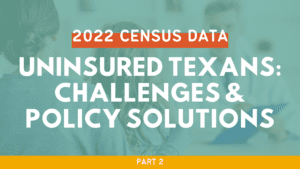

Equity in Focus
Hispanic and Black Texas adults are uninsured far more often than Asian and non-Hispanic white adults. Being uninsured is driven by economic barriers, and also causes family financial instability for many. Inability to seek or afford needed care means uninsured Hispanic and Black Texans face higher barriers to working and parenting at their highest capacity.
2018 Uninsured Rates by Race/Ethnicity — Texas Adults 19-64
- White, non-Hispanic: 14.8%
- Black, non-Hispanic: 22.7%
- Asian, non-Hispanic: 13.6%
- Hispanic: 38.0%





